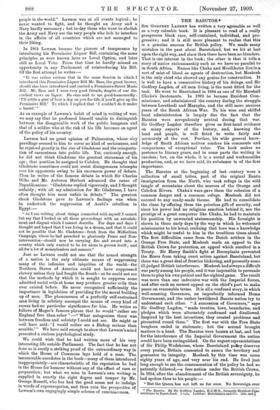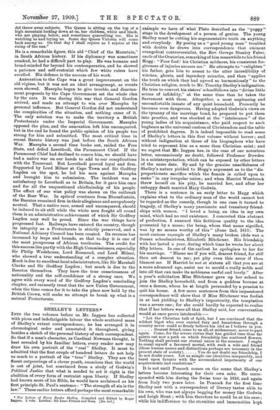THE BASUTOS.* ' SIR GODFREY LAGDEN has written a very
agreeable as welt as a very valuable book. It is pleasant to read of a really prosperous black race, self-contained, individual, and pro- gressive ; and it is still more pleasant to realise that this is a genuine success for British policy. We made many mistakes in the past about Basutoland, but we hit at last upon the right way, and since then there have been no blunders. That is one interest in the book; the other is that it tells a. story of native statesmanship such as we have no parallel 1,0 in South Africa. Names like Chola, and Mosilikatze live in a sort of mist of blood as agents of destruction, but Moshesh is the only chief who showed any genius for construction. It is well to have a consecutive history of his doings, and Sir Godfrey Lagden, of all men living, is the most fitted for the task. He went to Basutoland in 1884 as one of Sir Marshall Clarke's lieutenants. In 1893 he became Resident Com- missioner, and administered the country during the struggle between Lerothodi and Masupha, and the still more anxious years of the South African War. To his wise and skilful local administration is largely due the fact that the Basutos were scrupulously neutral during that war. Sir Godfrey Lagden therefore gives us first-hand evidence on many aspects of the history, and, knowing the land and people, is well fitted to write fairly and accurately of the rest. Further, his wide general know- ledge of South African natives renders his comments and comparisons of exceptional value. The book makes no pretence to literary grace, and in some parts the writing is careless; but, on the whole, it is a sound and workmanlike production, and, as we have said, its substance is of the first importance.
The Basutos at the beginning of last century were a collection of small tribes, part of the original Bantu immigration from the North, who took refuge in the wild tangle of mountains about the sources of the Orange and Caledon Rivers. Chaka's wars gave them the cohesion of a common danger and a common refuge. Moshesh_ did not succeed to any ready-made throne. He had to consolidate the clans by offering them the priceless gift of security, and since his power had no religious sanction behind it, nor the prestige of a great conqueror like Chaka, he had to maintain his position by unwearied statesmanship. His foresight is shown in these early days by the way in which he welcomed missionaries to his kraal, realising that here was a knowledge which might be useful to him in the troublous times ahead. The first difficulties came from the Dutch settlers in the Orange Free State, and Moshesh made an appeal to the British Crown for protection, an appeal which resulted in a Treaty. Sir Harry Smith's fight at Boomplaats prevented the Boers from taking overt action against Basutoland, but there was a great deal of frontier bickering, and presently some ill-judged British interference. Moshesh had always a difficult war party among his people, and it was impossible to persuade them to play his own patient and far-sighted game. The result was more than one indecisive war with the Imperial forces, and after each an earnest appeal on the chief's part to make peace on reasonable terms. It is all a confused story, in which well-meaning Governors, an imperfectly informed Home Government, and the rather bewildered Basuto nation try to understand each other. " A succession of Governors," says Sir Godfrey Lagden, "made treaties, laws, boundaries, and pledges which were alternately confirmed and disallowed. Inspired by the best intentions, they created problems and pirouetted round them." The first war with the Free State burghers ended in stalemate ; but the second brought matters to a head. The Basutos were beaten at last, and but for the interference of the Imperial Government the nation would have been extinguished. On the urgent representations of Sir Philip Wodehouse, whose Basutoland policy deserves every praise, Britain consented to annex the territory and guarantee its integrity. Moshesh by this time was some eighty years of age, and very near his end. He lived just long enough to see the consummation of the policy he had so patiently followed,—a free nation under the British Crown. In 1854, after the abandonment of the British sovereignty, he had spoken thus to his people:— "But the Queen has not left us for ever. No Sovereign ever • The Batistes. By Sir Godfrey Lagden, R.C.X.G., formerly Resident Com, missioner in Basutoland. 2 vole. London : Hutchinson and CO. CPAs. net.]
did throw away subjects. The Queen is sitting on the top of a high mountain looking down at us, her children, white and black, who are playing. below, and sometimes quarrelling too. She is watching us and trying us. Some day Queen Victoria will come back among us. On that day I shall rejoice as I rejoice at the rising of the sun."
He is a remarkable figure, this old "Chief of the Mountain," in South African .history. If his diplomacy was sometimes crooked, he had a difficult part to play. He was humane and broad-minded far beyond his contemporaries, and he showed
a patience and self-restraint which few white rulers have excelled. His defence is the success of his work.
Annexation to the Cape was a great improvement on the old regime, but it was not an ideal arrangemevt, as events soon showed. Masupha began to give trouble, and disarma- ment proposals by the Cape Government set the whole clan by the ears. It was during this war that General Gordon arrived, and made an attempt to win over Masupha by personal influence. But General Gordon did not understand the complexities of the situation, and nothing came of it. The only solution was to make the territory a British Protectorate under the Imperial Government. Masupha opposed the plan, and the annexation left him unconquered, but in the end he found the public opinion of his people too strong for him and submitted. The most critical time in recent Basuto history was just before the South African War. Masupha a second time broke out, raided the Free State, and defied Lerothodi, the Paramount Chief. If the Paramount Chief had declined to coerce him, we should have had a native war on our hands to add to our complications with the Transvaal. But Lerothodi proved loyal and firm.
Supported by Lord Milner at Cape Town and Sir Godfrey Lagden on the spot, he led his men against Masupha and brought him to submission. The incident was as satisfactory to Lerothodi as to Britain, for it gave him once and for all the unquestioned chieftainship of his people. The effect of our wise policy was shown on the outbreak of the Boer War. In spite of overtures from Bloemfontein, the Basutos remained firm in their allegiance and scrupulously neutral. That a native race, armed and unconquered, should be induced to sit still while the white men fought all round them is an administrative achievement of which Sir Godfrey Lagden may well be proud. Since the war things have progressed fast. Railways have entered the country, though its integrity as a Protectorate is strictly preserved, and a National Advisory Council has been created. Its revenue has increased by leaps and bounds, so that to-day it is one of the most prosperous of African territories. The credit for this success lies partly with the High Commissioners, especially Sir Philip Wodehouse, Lord Rosmead, and Lord Milner, who showed a true understanding of a complex situation. Much is due to excellent local administrators, like Sir Marshall Clarke and Sir Godfrey Lagden ; but much is due to the Basutos themselves. They have the true consciousness of nationality and the self-confidence of a strong race. We agree with every word of Sir Godfrey Lagden's concluding chapter, and earnestly trust that the new Union Government, when the time comes for it to take the place now held by the British Crown, will make no attempt to break up what is a natural Protectorate.















































 Previous page
Previous page